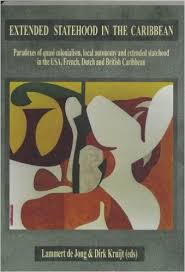2008 ~ Quite a number of islands in the Caribbean region have not yet gained independent status. They still have constitutional relationships with former colonial mother countries, be it Puerto Rico with the USA, the Netherlands Antilles and Aruba with the Netherlands, Martinique and Guadeloupe with the French Republic or the Caribbean Overseas Territories with Britain.
The status of the non-independent Caribbean remains ambiguous. None of the islands wish to stand on their own as sovereign states. A range of complexes is attributed to this (quasi) colonial status. They have sacrificed their cultural and political identities for a well-being that – by definition – cannot be fulfilled. The islands’ citizenry suffers from racial discrimination, not only at home, but also on the metropolitan mainland. And instead of exhausting every possibility to achieve sustainable development, a welfare mentality has overwhelmed the dynamics of the islands’ econonomies. Better off, yes, but at what price?
In this book, the islands’ connections with American and European metropolitan centers are considered lifelines which must be strengthened. The constitutional arrangement is defined as extended statehood, a form of government that is meant to supplement the island government. As de-colonization is not an option, it makes no sense to use alternative concepts such as dependency or re-colonization. These terms are biased and outdated. Circumstances have changed and require a format of analysis that goes beyond the old landscape of ‘colonies’ and ‘independent states’. The objective of this book is to promote a new look at extended statehood in the Caribbean while raising a number of questions relating to the operation of the different extended statehood systems across the region. What are their objectives? What is their mission? How are they organized? How do they operate? What are the advantages and what are the disadvantages? Are there any Gordian knots that cannot be solved?
The contributors to this book present a medley of interests in the Caribbean. Jorge Duany and Emilio Pantojas-Garica, University of Puerto Rico, describe the contradictions of Free Associated Statehood in Puerto Rico. Justin Daniel, University of the French Antilles and French Guiana (Martinique), contributed the part on the French Departement d’Outre mer (DOM)(Martinique and Guadeloupe). Peter Clegg, University of the West of England, Bristol, UK, delineates the United Kingdom’s relations with Caribbean Overseas Territories (COT). The chapter on the Kingdom of the Netherlands in the Caribbean is by Lammert de Jong, a former resident-representative of the Netherlands in the Netherlands Antilles. Francio Guadeloupe, University of Amsterdam, provided the introduction to anti-national pragmatism. Dirk Kruijt, Utrecht University, assisted in editing the volume.
Table of Contents
1. Lammert de Jong – Extended Statehood in the Caribbean: Definition and Focus.
2. Jorge Duany & Emilio Pantojas-Garcia – Fifty Years of Commonwealth. The Contradictions of Free Associated Statehood in Puerto Rico.
3. Justin Daniel – The French Departements d’outre mer. Guadeloupe and Martinique.
4. Lammert de Jong – The Kingdom of the Netherlands. A Not So Perfect Union with the Netherlands Antilles and Aruba.
5. Peter Clegg – The UK Caribbean Overseas Territories. Extended Statehood and the Process of Policy Convergence.
6. Francio Guadeloupe – Introducing an Anti-National Pragmatist on Saint Martin & Sint Maarten.
7. Lammert de Jong – Comparing Notes on Extended Statehood in the Caribbean.
About the authors

